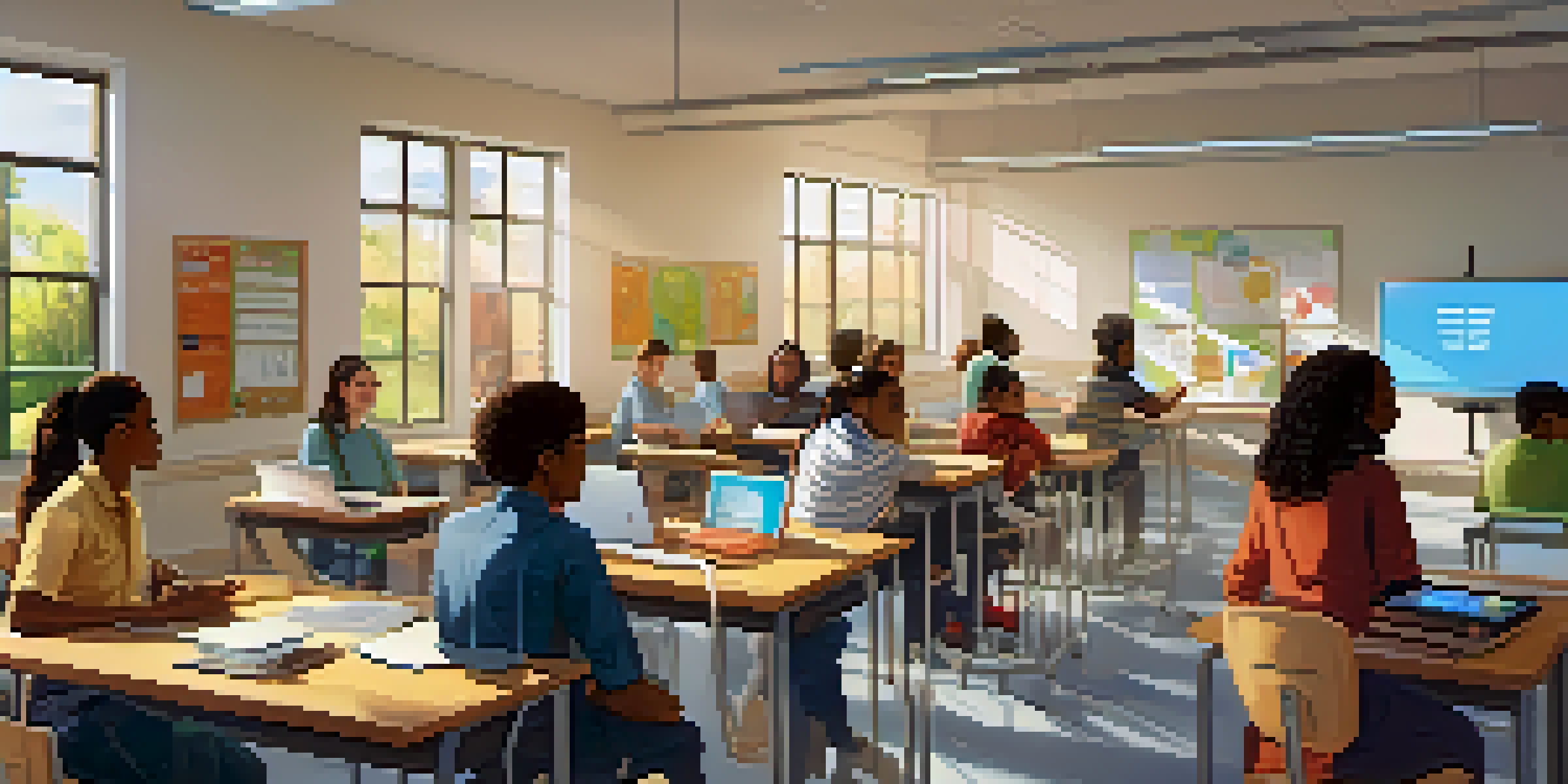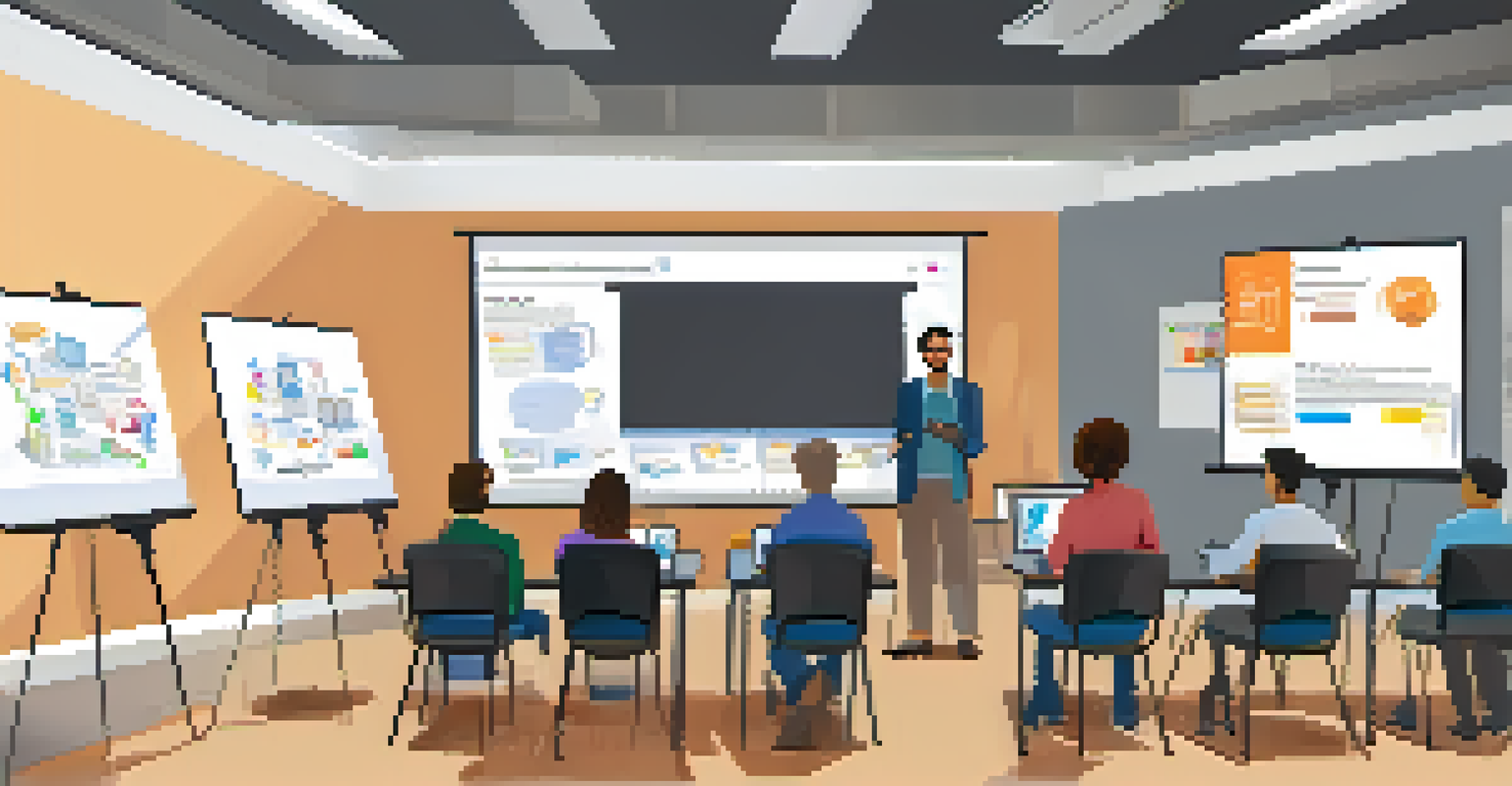Digital Literacy for Educators: Teaching in a Digital Age

Understanding Digital Literacy: Definition and Importance
Digital literacy goes beyond basic computer skills; it encompasses the ability to locate, evaluate, and use information effectively. In today’s world, where technology plays a pivotal role in education, understanding this concept is crucial for educators. It empowers teachers to enhance their teaching methods and engage with students in meaningful ways.
Digital literacy is not just about knowing how to use technology; it's about knowing how to think critically about the information we find online.
Moreover, digital literacy helps educators model the skills necessary for students to thrive in a tech-driven society. By embedding these skills in their teaching, teachers ensure that students are not just consumers of information but also critical thinkers and creators. As the landscape of education evolves, digital literacy becomes a vital part of the curriculum.
Ultimately, fostering digital literacy prepares students for future challenges. It equips them with the tools to navigate an increasingly digital world, making the role of educators even more significant in developing a digitally literate generation.
The Role of Educators in Promoting Digital Literacy
Educators are at the forefront of cultivating digital literacy among students. By integrating technology into their lessons, they create an engaging learning environment that reflects real-world applications. This hands-on approach not only captures students' attention but also encourages them to explore and utilize digital tools effectively.

Furthermore, educators must also provide guidance on responsible digital citizenship. Teaching students about online safety, ethical behavior, and the importance of privacy helps them navigate the digital landscape responsibly. This responsibility is essential as students spend more time online and interact with various digital platforms.
Digital Literacy Empowers Educators
Understanding digital literacy allows educators to enhance their teaching methods and engage students effectively.
In essence, educators serve as role models in their students’ digital journeys. By demonstrating effective digital practices and fostering an environment of exploration and safety, they empower students to confidently engage with technology.
Key Digital Literacy Skills for Educators
There are several essential digital literacy skills that educators should master to facilitate effective teaching. These include proficiency in using educational technology, understanding data analysis, and the ability to create engaging digital content. Each skill contributes to a teacher's ability to enhance the learning experience.
The future belongs to those who understand the power of technology and can leverage it to create solutions for the world’s problems.
Additionally, educators should be adept at sourcing reliable information online. This skill not only helps them in lesson planning but also enables them to teach students how to discern credible sources from unreliable ones. In an age of misinformation, this is a crucial component of digital literacy.
Lastly, collaboration tools and platforms are becoming increasingly important in education. Educators must be comfortable using tools like Google Classroom or Microsoft Teams to promote collaboration among students, making learning a joint effort that reflects the interconnected nature of the digital world.
Embracing Technology in the Classroom
Integrating technology into the classroom can transform the learning experience. From interactive whiteboards to virtual reality, the possibilities are endless. When educators embrace these tools, they can create immersive and engaging lessons that capture students' interest.
For instance, using educational apps allows students to learn at their own pace and provide instant feedback. This personalized approach caters to diverse learning styles and encourages students to take ownership of their education. It also fosters a sense of responsibility as they manage their own learning journey.
Essential Skills for Educators
Proficiency in educational technology and reliable information sourcing are crucial skills for educators to teach digital literacy.
Moreover, technology can facilitate access to a wealth of resources beyond traditional textbooks. Educators can leverage online platforms to bring experts into the classroom or explore global perspectives, enriching the educational experience and broadening students' horizons.
Challenges in Teaching Digital Literacy
While the benefits of teaching digital literacy are clear, educators face several challenges. One significant hurdle is the varying levels of technology access among students. Not all students have equal opportunities to engage with digital tools, which can create disparities in learning.
Additionally, the rapid pace of technological change can be overwhelming for some educators. Keeping up with the latest tools and trends requires ongoing professional development and support, which may not always be readily available. This can hinder teachers from fully integrating digital literacy into their curriculum.
Lastly, there’s the challenge of addressing digital distractions. With so many online temptations, it can be difficult for students to stay focused. Educators need to find effective ways to harness technology while minimizing its potential distractions, ensuring that learning remains the priority.
Strategies for Teaching Digital Literacy
To effectively teach digital literacy, educators can implement various strategies. One approach is project-based learning, where students apply their digital skills to real-world problems. This hands-on experience not only reinforces learning but also fosters collaboration and critical thinking.
Another effective strategy is incorporating digital storytelling into lessons. This technique encourages students to use various digital tools to create and share their narratives. By doing so, they develop their creativity while honing their digital skills in a fun and engaging manner.
Future of Education is Digital
As technology evolves, educators must adapt their teaching methods to prepare students for a digitally driven future.
Lastly, educators can host workshops or training sessions on digital tools and resources. Providing students with the opportunity to explore and experiment with technology in a structured setting enhances their confidence and competence in using these tools effectively.
The Future of Digital Literacy in Education
As we look ahead, the importance of digital literacy in education will only continue to grow. With advancements in technology and the increasing integration of digital tools in classrooms, educators must adapt to prepare students for the future. This involves not only updating their skills but also rethinking traditional teaching methods.
Moreover, the future will likely see a greater emphasis on coding and data literacy. As technology becomes more embedded in everyday life, understanding how it works will be essential for students. Educators need to incorporate these elements into their curricula to ensure students are equipped for the digital workforce.

Ultimately, the future of education lies in the hands of digitally literate educators. By championing these skills, teachers can inspire the next generation to navigate the digital landscape with confidence and competence, paving the way for innovation and progress.